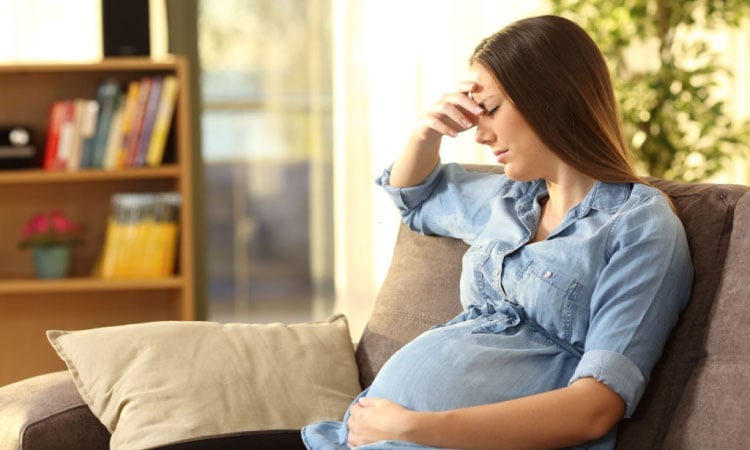Elders and doctors will advise you to eat plenty during pregnancy. But it is not that easy. Instead of eating ravenously, as shown in some advertisements and shows, most women feel loss of appetite during pregnancy, especially during their first trimester.
Loss of appetite during pregnancy is a very common factor. Women may feel detest to eat a certain food or any food at all. Knowing the causes and remedies of loss of appetite during pregnancy may help you to overcome it.
This article will answer many of your questions like why does loss of appetite during pregnancy occurs? What are its causes and harmful effects and how to deal with the loss of appetite during pregnancy?

What Causes A Lack Of Appetite During Pregnancy?
There is a lot of stuff going on inside your body as soon as you conceive. Apart from physical changes that pregnancy brings about, there are many emotional and hormonal changes which can be overwhelming as well as uncomfortable. Your mental health and physical comfort has a lot to do with loss of appetitive during pregnancy, though it does get better as you progress further in your pregnancy. Some of which are:
Causes of loss of appetite during pregnancy 1st trimester
Loss of appetite in early pregnancy for about 4 weeks can occur due to nausea or morning sickness and vomiting. According to a source, about 70 to 80 percent of women suffer from vomiting and nausea during the first trimester. This happens because of the hormonal changes in the body. The other reasons for loss of appetite during the first trimester are:
- Fatigue-The progesterone level of your body suddenly increases that makes you feel fatigued and sleepy. Some may also suffer from headaches and loss of appetite during pregnancy. As a result, you feel a lack of interest in having a meal and want to sleep all the time
Related Reading: 22 Morning Sickness Snacks To Feel Better
- Constipation- The rise of progesterone also slows down the movement of food in your digestive tract and results in constipation. And you may not feel hungry or get allured by food when you are already constipated, though constipation can be easily cured with simple home remedies
- Heartburn- Increased pregnancy hormones relax the valve between the stomach and esophagus of your body. Thus often stomach acids leak into the esophagus and cause heartburn. Again it is natural that you will not feel to eat anything when your heart is burning due to acidity
Causes of loss of appetite during pregnancy 2nd trimester
In the second trimester, the mother’s body gets used to its little budding baby. Morning sickness passes and mothers feel hungrier in the morning when they wake up after a long sleep.
It is the best period of pregnancy. At this phase mother’s appetite increases, skin starts to glow, and expecting women start to experience evident weight gain. On the other hand, the major development and formation of the fetus takes place during the second trimester. Thus it becomes very important to provide proper nutrition to your baby during this time.
Calculate Due Date With LMP
But some mothers may feel a lack of interest in having some specific foods. This is because:
- Growing uterus- By this time, though baby bump does not occur, the uterus starts growing big and creates pressure on the lower abdomen area and stomach. As a result, the digestive system gets a bit slower and you can also get constipated
Related Reading: 18 Foods To Eat To Increase Fetal Weight During Pregnancy
Causes of loss of appetite during pregnancy 3rd trimester

Your belly gets really big by this time. So you will feel uneasy not only while eating but also while walking, and even talking. The causes of appetite loss in the third trimester can be:
- Stress and depression- Some mothers get cautious about how their body is changing. Some get depressed due to a lot of weight gain. Thus they may try to control their appetite to stay fit for delivery and afterward. Its clinical name is Anorexia nervosa.
Depression for any reason can adversely affect appetite. Studies show that perinatal depression results in malnutrition and poor physical and cognitive development of the baby.
Work-life stress or family problems can also easily affect the mother’s mental health during this time. Pregnancy is a sensitive time for mothers.
Emotional outbreaks and mood swings are very normal at this time. All these can result in loss of appetite during pregnancy.
- Eating disorder- In pregnancy, it is important to eat on time. But due to unhealthy eating and untimely eating, mothers often find it difficult to eat healthy at the correct time. If this disordered eating becomes one’s habit then it is called an eating disorder.
Studies show that women with an eating disorder get anxious, use more laxatives, eat less and exercise more during their pregnancy.
Besides Mothers may get sensitive to the smell of some food such as fish. It is very common in pregnancy. The craving for some spicy or smelly dishes may get less during pregnancy, but you will have to supplement its nutrition with other food.
What Happens If You Don’t Eat Enough During Pregnancy?
There can be serious side effects of not eating enough food during pregnancy. These are:
- Premature delivery- Lack of appetite results in lack of nutrition. And lack of nutrition of the fetus can cause miscarriage or premature delivery. Premature babies use to have a high risk of lung and heart problems
- Birth defects- If the mother does not eat calcium-rich food properly then the baby will not get strong bones and teeth. A fetus requires 600 to 800 mcg of folic acid daily to ensure proper development of the brain and the spinal cord. The deficiency of folic acid can cause serious defects like spina bifida in babies
- Inability to produce breastmilk- Mother’s breasts gain lots of weight for the production of milk. So, if the mother does not eat properly during pregnancy, then she cannot store enough fat in her breasts to produce milk. This can make your baby deprive of your breastmilk and all the necessary nutrients and immunity protective factors in it. There are certain foods that should be completely avoided during breastfeeding
- Mother’s health fails- in general, a woman should gain about 30 pounds during her pregnancy. It is important not only for the baby’s health but also for the mother’s. As the fetus is growing it will take iron and calcium from your body to make its bones and muscles. So if the mother does not eat well then she will eventually suffer from anemia and calcium deficiency.
How To Cope With Loss Of Appetite During Pregnancy?
Now that you know how much it is important to eat healthy during pregnancy, you must try to practice it. You may feel extreme food aversion in pregnancy for certain foods. Ignore those.
But do not eliminate its nutrition. Try substituting with equally nutritious food. For instance, if you are not feeling good while drinking milk, then eat curd or paneer instead to get the calcium.
Related Reading: Top 10 Protein-Rich Foods For Pregnancy
6 Ways To Get Back Appetite During Pregnancy

Following are 6 ways to get back appetite during pregnancy.
- Eat small meals in short duration- If you are feeling uneasy to eat bellyful at one time then simply divide it into small portions and eat in a small duration. Digesting small nutritious meals is easy. This will help you overcome the initial uneasiness and vomiting during the first trimester of pregnancy
- Include lemon and ginger to combat nausea- Ginger during pregnancy is highly recommended and so is lemon. What better than ginger tea with a pinch of lemon? This will reduce nausea and make you feel energetic and increase your appetite
- Eat fiber-rich food- Add baby carrots, cucumber, green beans, etc. to your salad. The fiber in these foods will soothe your constipation problems and increase hunger
Related Reading: 21 Pregnancy Superfoods To Include In Your Pregnancy Diet
- Eat less oily and less spicy food- If you are suffering from heartburn and cannot eat properly then you should avoid spicy oily food from your pregnancy diet. For instance, you can eat chicken stew or boiled chicken with lemon and black pepper instead of having chili chicken
- Include some sweets- Sugar helps in better digestion, so you can have a bit of plant-based sugar in your pregnancy diet. Eating fresh organic berries, oranges, dried raisins in snacks is good for gaining appetite. Eating pickles, lemons, and other citrus fruits will also help you to relieve the feeling of puking
- Try healthy warm soups- If you are detesting heavy meals like rice and bread then you will at least have to eat some veggie soups. You can add chicken or egg, and favorite vegetables in the soup and have it warm. Drinking fruit smoothies, such as a banana almond smoothie, strawberry oat smoothie, etc. is also helpful to cure lack of appetite
Following these tips, you can overcome your loss of appetite during pregnancy.After the initial 3 months, your body will eventually cope up with the situation and your hunger will increase.
But if you are suffering from extreme food aversion and losing weight considerably during pregnancy then you will require proper medication. For such a case consult with your doctor.
FAQs
Yes, it is very much normal for pregnant women to lose appetite. Generally, this happens mostly in this first trimester due to hormonal misbalance.
Normal food aversion due to nausea will not bring about any adverse outcome. But, yes, unaddressed extreme food aversion can bring about miscarriage. Because in extreme cases, malnutrition can end up in miscarriage.
If the mother does not take enough nutrients daily, then how will she be able to hold the baby inside? This might eventually end in miscarriage and premature delivery.
